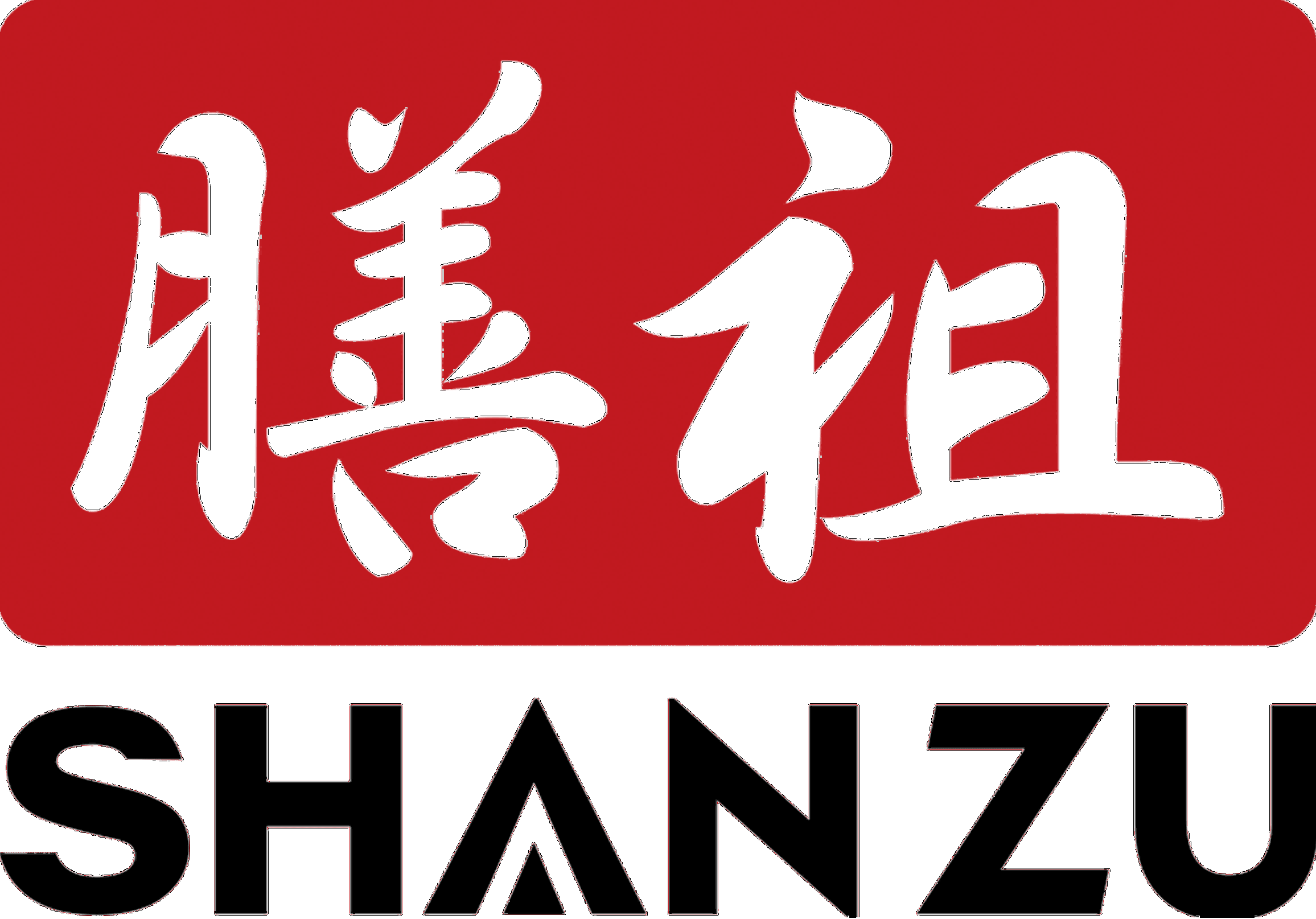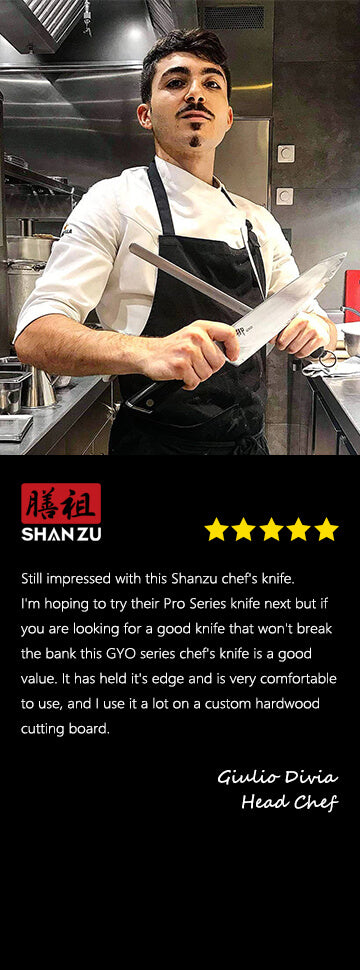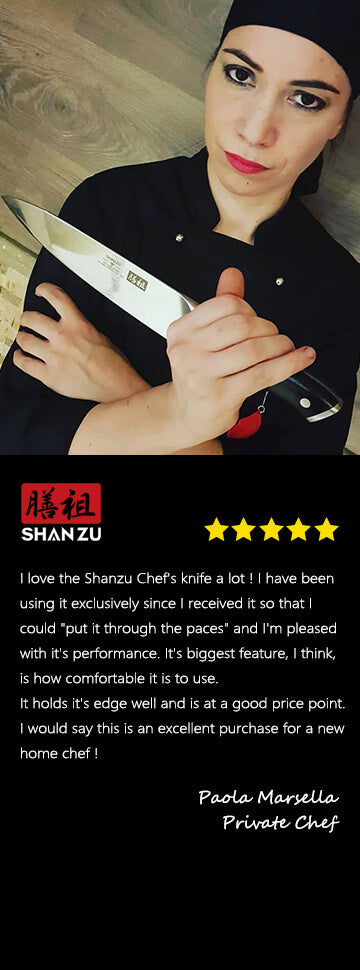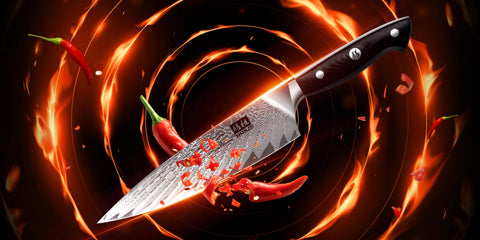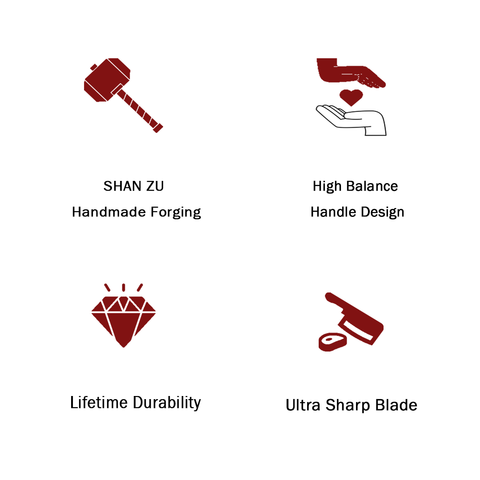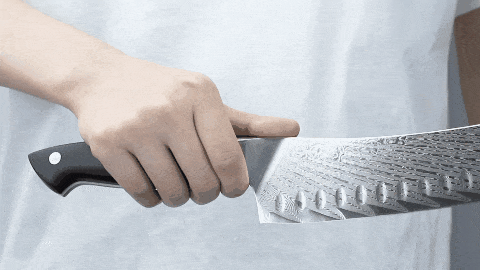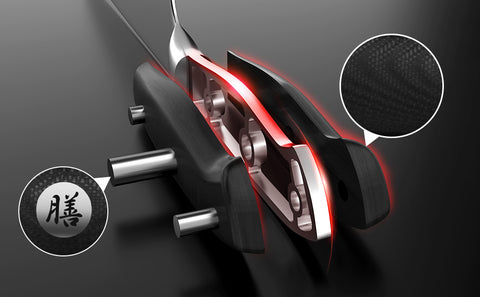L'avis de Nos Chefs Pros
Ne nous croyez pas sur parole, lisez ces témoignages!
Rejoignez le club exclusif SHAN ZU!
Couteau de Cuisine SUN Damascus
Plongez dans votre voyage culinaire avec l'agilité d'un requin des profondeurs; chaque tranche est aussi précise et flexible, reflétant la force implacable du plus grand prédateur de l'océan.
Cutting-Edge Performance
Ruthlessly sharp, the edge of the SUN series is meticulously sharpened by expert craftsmen at 13-15°. Carefully tapered for minimal drag, the agile blade ensures fast and precise cuts effortlessly.
Great Balance
Ergonomic shape of the miter for a natural and flexible grip.
Robust G10 Handle
Pure silk - Resistance, durability, and control. Tapered mitre, extreme comfort, perfect balance!
What matters most to you
Free standard shipping for all orders. SHAN ZU kitchen knife available worldwide.
*The following regions are excluded: United Kingdom, Ireland, Australia, Canada, Africa, Middle East.
SHAN ZU kitchen knife sold worldwide.
*The following regions are excluded: United Kingdom, Ireland, Australia, Canada, Africa, Middle East.
The delivery time depends on the destination. Generally, it takes between 3 and 14 days. International shipping is possible to most countries. If we cannot deliver to your country, we will contact you. Additionally, we will inform you about your order by sending you an "order confirmation" and a "shipping notification" after you have placed your order.
Returns are accepted within 30 days from the delivery date, in accordance with our refund policy. Simply send us an email and we will tell you the steps to follow.
Official SHANZU email: shanzu@shanzuchef.com
To clean and maintain your knife, it is best to follow these steps: First, clean the blade with warm water and dish soap. Be sure to rinse and dry the blade thoroughly to prevent rust. Then, use a sharpening steel to sharpen the blade.
Next, use a sharpening steel to sharpen the blade. This will help maintain the edge and ensure the knife is in good working condition.
If the blade is very dirty or if food is stuck, you can use a soft-bristled brush to gently clean it. After cleaning and sharpening the blade, apply a thin layer of oil to the blade and handle. After cleaning and sharpening the blade, apply a thin layer of oil to the blade and handle to prevent rust and keep the knife in good condition. Finally, store the knife in a safe, dry place, away from heat and moisture. Finally, store the knife in a safe, dry place, away from heat and moisture. A knife block or a knife drawer organizer is a good option, as it will protect the blade and prevent accidents.
To sharpen a knife, you will need a SHANZU sharpening stone or a knife sharpener. To use a sharpening stone, first soak the stone in water for about 10 minutes. Then, place the knife flat on the stone and tilt the blade so that it forms an angle of 10 to 15 degrees with the stone. Using long, steady strokes, move the blade back and forth on the stone, making sure to maintain the blade angle. After a few strokes, move the blade to the other side of the stone and repeat the process. You should sharpen the blade along its entire length, and you may need to repeat the operation several times to achieve the desired sharpness.
What is Damascus steel?
The origin of the name "Damascus steel" is controversial: two Islamic scholars, Al-Kindi and Al-Biruni (around 800-873 AD), both wrote about swords and sword steels based on the appearance, the geographical location where they were produced or forged, or the name of the blacksmith. Both authors also mention the terms "damscene" or "damascus" when describing swords to some extent.
Based on these references, there are three possible sources from which the term "Damascus" in the context of steel originates:
Al-Kindi calls "Damascene" the swords forged in Damascus in Siberia, but it is important to note that these swords are not described as having a wavy appearance on the steel surface. Al-Biruni refers to a swordsmith called Damascene who made crucible steel swords. In Arabic, the word "damas" means "sprinkled," and Damascus blades are often described as having a water-like pattern on their surface.
The most common explanation is that the steel is named after the capital of Syria, Damascus, the largest city of the ancient Levant. It may refer to swords made or sold directly in Damascus, or simply to the appearance of the typical patterns, by comparison with damask fabrics, which also bear the name Damascus.
What is German steel?
German knives are generally made of stainless steel, with a Rockwell hardness rating between 56 and 58. Stainless steel contains chromium. This lowers the Rockwell rating. The advantage is that the knife blade resists corrosion and rust.
Chefs generally agree that German-style stainless steel knife blades are more durable than Japanese-style blades. Chefs generally agree that German-style stainless steel knife blades are more durable than Japanese-style blades. Its durability allows you to use it for more cutting and chopping tasks.
The softer characteristic of the steel still allows for a sharp edge, but stainless steel will require you to sharpen and hone it more often. The softer steel also makes sharpening the blade easier, although a stainless steel blade means a German knife will lose its edge faster than its Japanese counterpart, which is made of high-carbon steel.
